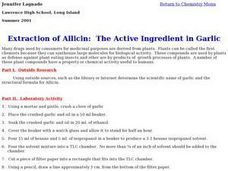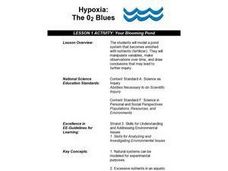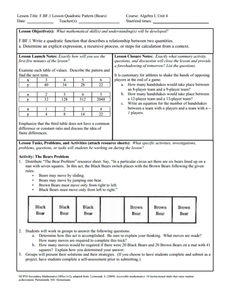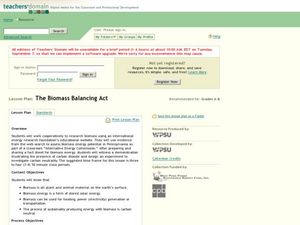Curated OER
Birth, Growth, And Development
Students understand that all living things have a life cycle that includes being born, developing into an adult, reproducing, and eventually dying.
Curated OER
Extraction of Allicin: The Active Ingredient in Garlic
Students conduct research to determine the structural formula for Allicin, a component of garlic. They participate in a lab to extract Allicin from garlic and complete a set of questions about their work.
Curated OER
Evolution: Adaptation
Tenth graders practice new skills and apply them. The skills of research should motivate them to want more knowledge. The concept of adaptation is used as a context for the lesson of practicing research skills.
Curated OER
Mapping Seamounts in the Gulf of Alaska
Students describe major topographic features on the Patton Seamount, and interpret two-dimensional topographic data. They create three-dimensional models of landforms from two-dimensional topographic data.
Curated OER
Enzymes in Action: An Inquiry Approach to the Effects of Enzymes
Students experiment with enzymes as key components of chemical reactions in all living things through this series of lessons.
Curated OER
Who Works in This Forest?
Students examine the variety of jobs that are related to working in the forest. Information on the different jobs is provided in this lesson plan for the teacher to share with the students. The students create a collage using magazines...
Curated OER
At Home on the Prairie
Students discover the importance of the bison within the prairie ecosystem and Native American culture, and explain the importance of habitat and place to living organisms.
Curated OER
Head to Foot
Students describe the body form and major anatomical structures of squids and describe some unusual or unique features of newly-discovered deep water squid species. They infer what types of food squids use from their anatomical features.
Curated OER
Rubber Gardens
Students recycle discarded automobile tires and create gardening sites for limited space areas.
Curated OER
Christmas Tree Farming in Ontario
Students realize that Christmas trees produced in Ontario are a field crop that is harvested annually. They find out that Christmas tree farming is important to the economy and the environment of our province.
Curated OER
The Acid Rain Test
Fourth graders engage in a research project to increase their ability to conduct experiments, interpret data and discuss results in a scientific paper. After doing a lab which simulates effects of acid rain, pairs of students write a...
Curated OER
Goals of the Diversity of Life Unit
Students are introduced to the unit on the importance of diversity of life and the role that interdependence plays in our worlds. this is part of a multi-lesson unit on the diversity of life.
Curated OER
Your Blooming Pond
Pupils model a pond system that becomes enriched with nutrients (fertilizer). They manipulate variables, make observations over time, and draw conclusions that may lead to further inquiry. They, in groups, simulate a pond environment.
Curated OER
The Transformation and Use of Different Types of Energy Using Local Flora and Fauna in a Vietnam Village Setting
Eighth graders examine the concept that the sun is the ultimate source of energy for living things. They conduct an experiment in which they roast marshmallows over a flame that has been produced from methane gas, which originates from...
Curated OER
Bears
Students complete a variety of bear-related activities. They sort and graph teddy bears, distinguish between real and non-real bears and research bear life cycles and habitats.
Curated OER
Leaving Home
Young scholars explain the importance of larval dispersal and retention to populations. They collect data on organisms and examine it.
Curated OER
Rainforest Deforestation and the Water Cycle
Students create terrariums (mini rainforests). They observe and discuss the life processes that occur in their terrariums and how changes in these processes affect the plants and organisms inside. They collect and graph data and present...
Curated OER
Charge It!
Pupils complete an experiment using balloons to help them examine the concept of static electricity. They discover how engineers use this information to create better air filters for homes. They describe how to charge an insulator as...
Curated OER
Mountains in the Sea Exploration No Escape
Young scholars study data to hypothesis about the influence of a water circulation cell on the retention of benthic invertebrate larvae in the area of a seamount. They investigate the positives and negatives of larvae retention in this...
Curated OER
Marketing the New Hybrids
High schoolers work together to develop a hypothesis on the natural and applied hybridization of certain species in an ecosystem. Using the internet, they research this topic and read any recent articles or studies. They must note the...
Curated OER
The Biomass Balancing Act
Students work in groups to research biomass using the International Energy Agency's website. Students use evidence from the web search to assess biomass energy potential in Pennsylvania as part of a classroom "Alternative Energy...
Curated OER
Invasive Species
Students use the Internet to research non-native plants that exist in their local community. Using this information, they analyze the invasive species effect on their environment. In groups, they plan and execute their own project to...
Curated OER
Goobers. Goobers? Goobers!
Students begin the lesson by noting the many ways in which to use peanuts. In groups, they use the internet to research the work of George Washington Carver. They discover the allergies and nutritional information of the peanut and...
Other popular searches
- Pictures of Plant Products
- Plant Products and Uses
- Plant Products Grains
- Important Plant Products
- Plant Products Worksheets
- Plant Products Geography



